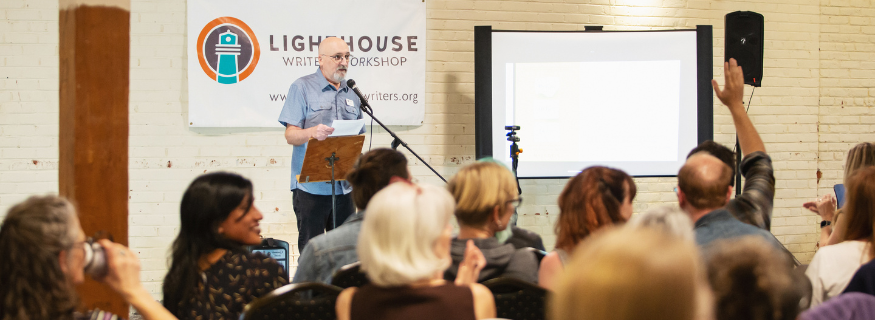
Editor's note: The Book Project is a two-year program that gives writers the classes, mentorship, and support they need to finish a book-length work. The Book Project is currently accepting applications, and fellowships are available. Click here for more information. Applications are due June 24.
I asked my graduating cohort to list the things they’ve learned from their two years at the Book Project. Here are their beautiful responses!
—Erika Krouse
As Erika's six Book Projecteers near graduation, we recognize that they have not only completed a two-year intensive program alongside fellow writers, but have also picked up a lot of nuggets of wisdom along the way! Check out what they had to say about how the Book Project taught them about process, perfectionism, revision, and community.
Jihyun Yun
-
Perfectionism is a time vampire.
-
Much of what you write in your first draft will be unusable and cut in your second. This is not a waste of time.
-
I work best with structure and appeasing my kindergarten brain. A.K.A. daily logs, word count goals, stickers for the days I cross everything off my checklist.
-
I need to put time limits on how long I research otherwise I’ll go down a rabbit hole and start looking up all manners of crap.
-
Revisions are oftentimes harder than the first draft.
-
Writers need a support system of other writers.
-
First drafts are for exploration and figuring out your own story. It often won’t make much cohesive sense and that is okay. I imagine even second and third drafts lack cohesions. Combing it out is what the later drafts are for.
Julia Halprin Jackson
-
Revision doesn’t mean rearranging words. It means rethinking concepts, plot points, character arcs, thinking big.
-
Character agency (or lack thereof) can make or break a manuscript. It is far more exciting to see characters acting decisively than it is to read about them contemplating future actions.
-
Over-writing can be helpful, at least for me. When I started the project, I had about 55,000 words composed as wannabe short stories. None of these pages appear as they did in that initial draft, but each one of those words got me closer to understanding what I want to say. They were not wasted breath or space; they were critical to my process.
-
While actions are important, it is also important to really show the impact of each action. This piece of feedback is informing how I approach draft #3. How can fewer things happen but with a bigger emotional impact?
-
Messy characters are fun to write! And fun to read. While their messiness needs to be believable (still working on that), I’ve learned to really lean into character faults, weaknesses, fears.
-
It’s okay to shift directions or alter your timeline. Maybe a plot point made more sense in an outline than it did in the scene, or maybe as you are writing that scene, something more surprising pops up. I’ve learned to trust that surprise and follow it, even if it means revising what comes next.
Aakriti Pandita
-
Need for clarity: just because it’s clear in your head doesn’t mean it’s a story. It’s a story when it takes shape in a reader’s mind.
-
A good community of writers is crucial to growth as a writer.
-
Perfectionism is the writer's antagonist. It’s more important to stick to the deadline and produce something than it is to delay for the sake of value.
-
Writing in one’s mind is as important on writing on paper. Introspection goes a great way.
-
Teaching is a way to explore and understand your own limitations.
-
It’s OK to give yourself permission to be a pantser!
Candice May
-
Writing takes time, it is a slow process, so allow plenty of time for it, take the pressure off to write ‘fast drafts’; it doesn’t matter how fast a draft is because you’ll have to change it anyway, which takes time. So allow more time that you think you’ll need. Be the tortoise (slow ’n steady, best cliche in the world).
-
When I started the BP I wanted to figure out a way to make my first drafts more ‘efficient’, but I’ve since realized, similar to #1, that writing is not an efficient craft. It’s more of a quest, with meanderings, side roads, wrong turns, mishaps, and more questions than answers.
-
Your process is unique to you. Find what works for you, and do that. Don’t try to copy some other writer’s process because it probably won’t work for you.
-
Not knowing is a good thing. It means you’re onto something innovative. Lean into the not knowing, even if (especially if) it feels scary.
-
Underestimate what you’re able to accomplish. Set small goals that you can meet. Don’t set your expectations so high for yourself that you’ll feel like you’re always failing.
Nur Ibrahim
-
PATIENCE.
-
Organization skills that mainly required me writing daily!
-
Breaking down a story to core essentials in its structure….and forcing myself to be practical.
-
Realizing this is a marathon, not a sprint.
-
Learning the business of writing is an underrated part of the process.
-
I need a community to do this with.
Emily Werner
-
Routine is Queen.
-
Be gentle with yourself while also staying accountable to yourself.
-
Community is key.
-
Believe in your book.
-
Writing can happen even when you’re not writing.
-
Let it be shitty!!!
-
The process is the point.

